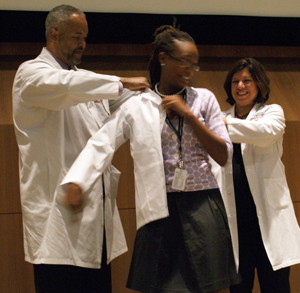 |
Rubens Pamies, M.D., left, and Tina Flores, M.D., right, assist SMDEP student Melissa DeLoach (Xavier University of Louisiana) with her lab coat. |
Patients who live in rural Nebraska communities must, at times, travel hours to Omaha for treatment.
Despite the widely reported boom in the Hispanic population, only 2.8 percent of the U.S. health care providers are Hispanic. American Indians make up .3 percent. Blacks represent just 3.5 percent of health care professionals, a number that hasn’t changed much since 1950.
It is for all of these reasons that Tina Flores, M.D., assistant professor in UNMC department of family medicine, aims to encourage this year’s Summer Medical and Dental Education Program (SMDEP) students.
“My goal is to increase the number of health care providers who desire to work in underserved communities,” Dr. Flores said. “Programs like SMDEP are critical to preparing students for professional school.”
Nearly 80 students have embarked on a six-week journey at UNMC. They will take rigorous coursework, produce science projects, shadow health care providers and learn strategies for admission into medical or dental school.
Dr. Flores recounts SMDEP experience
Dr. Flores knows from personal experience the value of the SMDEP program. As the keynote speaker at the opening ceremonies of this summer’s program, she shared her own SMDEP experiences.
“The first time I saw a cadaver, I saw it in an SMDEP program,” she said. “During the program, I took tough science classes and mock medical school exams. So, by the time I entered medical school, I already had the confidence that I could succeed.”
Dr. Flores shows SMDEP works
She is proof that these type of pipeline programs work, said Rubens Pamies, M.D., vice chancellor for academic affairs and dean for graduate studies.
In 2005, Dr. Pamies assembled a team of UNMC faculty and staff to secure the grant for the SMDEP program. A group of 12 U.S. universities host the program funded by the Robert Wood Johnson Foundation.
“This competitive program is already paying dividends at UNMC,” he said. “Several SMDEP graduates have applied and enrolled at UNMC. It is a great program to reach out to our rural Nebraska students as well as students from across the U.S.
“Our hope is that they will form relationships with UNMC faculty and staff as well as each other. When they return to their home campuses, they will spread the word about the great educational and research opportunities available at UNMC.”
Program addresses critical issues
UNMC’s program teaches students about health disparities that exist in urban, rural, racial and ethnic minority populations. This unique addition to the program helps students develop responsibility and desire to serve vulnerable populations.
“Students often return to their communities with a spirit of service,” Dr. Pamies said. “They use the tools and information they learned in our SMDEP program to create projects to help underserved patients.”